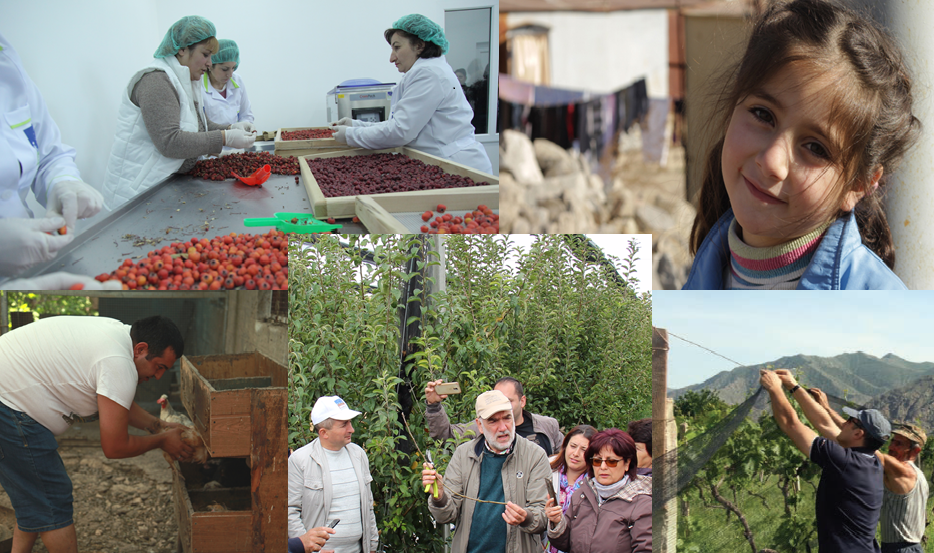Enhancing Human Security in Communities of Armenia
What we do
The “Enhancing Human Security in Communities of Armenia” project supports Armenia’s efforts in achieving the 2030 Agenda by building resilience, strengthening social protection, and improving economic and food security through the creation of sustainable economic opportunities in targeted vulnerable communities in Shirak, Lori and Tavush regions.
The project is funded by the UN Trust fund for Human Security and is being implemented by UNDP, UNICEF, WFP, UNIDO, FAO and IOM. The integrated Human security approach within the project addresses individual rights, good governance and access to education, ensuring that opportunities and choices are fulfilled at maximum potential, and are aimed at reducing poverty, achieving economic growth and community resilience, as well as promoting understanding of human security in terms of the risks and insecurities faced by individuals and groups at grass roots level. In this regard the gender equality lies in the foundation of the project logic for fully realizing the rights and potential of women and men.
Through a unified and fully inclusive needs assessment interventions the project is bringing a great degree of evidence-based actions shared across various UN agencies and government stakeholders for greater level of risk informed development and community planning, self-governance and sustainable rural entrepreneurship for the 41,567 general beneficiaries in 41 settlements (former villages) of Amasia, Alaverdi, Berd and Tumanyan consolidated communities.
Some results so far
In first year of the project implementation, 35 early warning systems were installed in settlements of the consolidated 4 communities. Comprehensive and participatory community vulnerability and capacity assessments and scientific multi-risk assessments and community development planning exercises increased risk-informed development for resilience.
Achieving gender equality and the empowerment of women represents a collective, organizational and programmatic endeavor of project staff and stakeholders. In this regard the project organized a “Gender Mainstreaming in Disaster Risk Reduction” training for the representatives of target community administrations, schools and private sector, introducing knowledge and practical skills on gender equality, prevention of gender-based discrimination and violence in disaster settings. Importantly, minimum 30% of allocated support for sustainable agricultural and non-agricultural entrepreneurship will be allocated to women and women’s groups. In this regard, a small production of herbal teas is being considered to be supported for installation of new production lines, natural and artificial herbal dryers, organization of new collection centers and establishment of greenhouses for high value herbs and berries. The organization will will increase its production volume immediately, creating more then 100 jobs within next 2 years, predominantly for local women, bringing social impact with a multiplying effect, and promoting safe production for the environment and smart utilization of forest resources.
Expected results
Within the first year of implementation, the project interventions include built kindergartens and schools with comprehensive school safety standards in Amasia and Alaverdi consolidated communities.
In Amasia community a group of farmers will receive a seed cleaning and packaging equipment, enabling them to expand their lands and further gather local farmers in collective farming, avoiding middlemen, increasing profitability and sales.
The project support for building a new irrigation system enables a group of out-migrated Armenian citizens to return to their homeland, and now they are establishing plants for growing strawberries, raspberries’ and blackberry in Alaverdi establishing 12-15 jobs.
In Berd consolidated community, a food collection center and a greenhouse for collective group of 15 local farmers is being built, for cultivation of unused lands in more profitable smart agriculture.
Also, a demonstration farm is being built for effective presentation of best agricultural practices, introduction of modern irrigation technologies and combating harmful insects. The demonstration farm will also conduct trainings, sectoral counselling, provision of successful business models for increasing productivity and revenues.
Hence, the synergies between this joint project interventions are gradually becoming a critical flagship catalyst for UN in Armenia, delivering as one to achieve human security in Armenia.

 Locations
Locations
